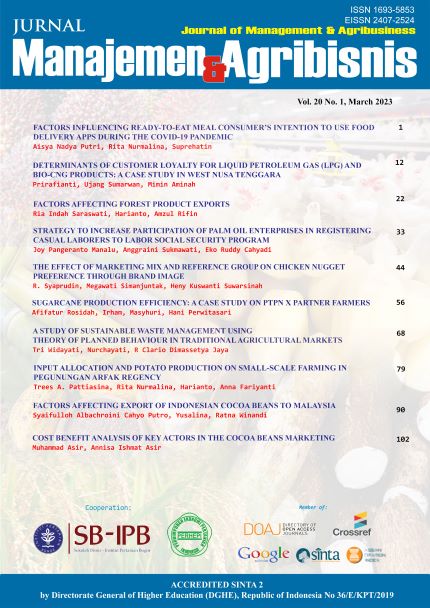Factors Influencing Ready-To-Eat Meal Consumer’s Intention To Use Food Delivery Apps During The Covid-19 Pandemic
Abstract
Food delivery apps (FDA) are one of the most popular types of online marketing media, providing convenience for consumers to order ready-to-eat meals. The possibility of using and ordering food through FDA has also increased with the rise of Covid-19 cases as people practice social-distancing as a form of subjective norm. This study aims to analyze factors influencing consumers’ intention to use FDA during the pandemic. The primary data from online survey of 327 greater Jakarta residents who previously have or have not used FDA was analyzed using structural equation modelling. Factors significantly related to intention of the theory of reasoned action (TRA), technology acceptance model (TAM), trustworthiness, and perceived risk integration were subjective norm, perceived risk, and attitude, while other variables with significant direct effects were: (1) subjective norm and perceived risk towards attitude and (2) perceived ease of use towards attitude, perceived usefulness, and trustworthiness. Attitude were found moderating the relationship between subjective norms, perceived ease of use, and perceived risk with intention. TRA as a constituent theory was found to be the best at describing purchasing intention through FDA. Managerial implications for third-party FDA and partner restaurants were formulated from these findings.
Keywords: consumer intention, food delivery apps, technology acceptance model (TAM), theory of reasoned action (TRA), ready-to-eat meal marketing
Authors
Authors who publish with this journal agree to the following terms:
- Authors retain copyright and grant the journal right of first publication with the work simultaneously licensed under a Creative Commons Attribution License that allows others to share the work with an acknowledgement of the work's authorship and initial publication in this journal.
- Authors are able to enter into separate, additional contractual arrangements for the non-exclusive distribution of the journal's published version of the work (e.g., post it to an institutional repository or publish it in a book), with an acknowledgement of its initial publication in this journal.
- Authors are permitted and encouraged to post their work online (e.g., in institutional repositories or on their website) prior to and during the submission process, as it can lead to productive exchanges, as well as earlier and greater citation of published work (See The Effect of Open Access).

